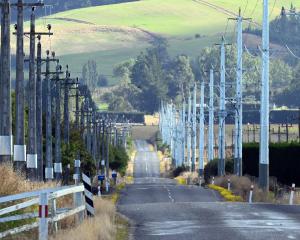It is all in the slide of the pen and a lick of a stamp, Dunedin writer Sasha Turner says.
The winter sun is sinking lower these afternoons, yet still, the local postie treks down the slippery footpath outside my front door.
The big bag slung across her shoulder tells me people still have plenty to write about.
The big question is, is it enough to keep these bulging calf muscles moving?
Headlines have been declaring the news for a long time, and sadly New Zealand Post is continuing with its proposal of decreasing the delivery days of standard mail to every second day, from next month.
And yes, the roles of these dutiful walkers are again under threat.
The jingle is familiar. It's all about cost cutting where revenue is decreasing.
But I'm not dancing.
You've probably heard the statistics.
According to New Zealand Post, Kiwis are posting 265 million fewer items per year than they did 10 years ago, a drop of 24%.
Total mail volumes are forecast to drop a further 25% within the next five years.
Virginia Wolf said ''life would split apart without letters'', a dramatic declaration from someone who, like me, valued the cradled envelope, its sealed contents a private account from one party to another.
Yes, there is the internet with all its avenues of communication and efficiency, but really, yawn, it's similar to trying to make love with your clothes on - there's no intimacy.
With a tap here and a tap there, the message is sent instantly, surfing swiftly on the invisible, yet busy cyber waves.
Ting, ting. You've got mail. And there you have it.
There's something unquestionably unique about a letter or card.
The handwriting flows over the envelope, and a stamp speaks of a journey from writer to recipient.
And it usually has the romance of catching people by surprise.
American author Phyllis Theroux says: ''A letter is a good way to go somewhere without moving anything but your heart.''
There's nothing like walking to the letterbox to see mail poking, like a sugar-coated tongue, out of its mouth.
Admittedly, there are usually a few predatory bills waiting to bite, but the sight of a letter always makes me jig a little.
The anticipation kicks in.
I will have torn open the envelope by the time I reach the front door.
The familiarity of a good friend's writing, and the gift of time given in writing the letter, is an act of love in itself.
But there's more to it than that.
The writing slopes from side to side, fuelled with feelings, facts and events.
It is, in essence, a little history in an envelope.
It may not be a monumental tale but it is, nonetheless, a document.
Because of letters we can look back on history - and learn.
And we can read in awe of the writer, that the writing we see, whether in a museum cabinet, or scanned to view on the internet, is authentic.
Every curve of a handwritten word is different.
New Zealand poet Frank Sargeson made letter writing a Sunday afternoon ritual, prolifically writing up to eight letters each time.
Jane Austen is famous for her published letters, as well as her novels.
I wonder what these people would have thought about the current politics, but I wonder more about what we would have lost if these people, to name a couple, had not had the enthusiasm to write and record.
Yes, we can tap, tap, tap away on our computers, iPhones, iPads, and convey the messages.
Yes, we can send them on the go.
Technology is incredible and convenient for the here and now, but in years to come, we have to accept that the dialogues rich in knowledge, wisdom, experience and secrets will be lost for future generations, unless of course we all leave our passwords to email accounts in our wills.
Back in the days of the early settlers, whalers, missionaries and traders, they had to rely on passing ships as that was the earliest form of communication delivery in New Zealand. Their letters are now national treasures.
And now, when my 2-year-old and I glimpse the postie walk past the window, I salute her stoic figure, as she carries this precious cargo through seas of change.
• This column was handwritten, stamped and posted to the Otago Daily Times.











